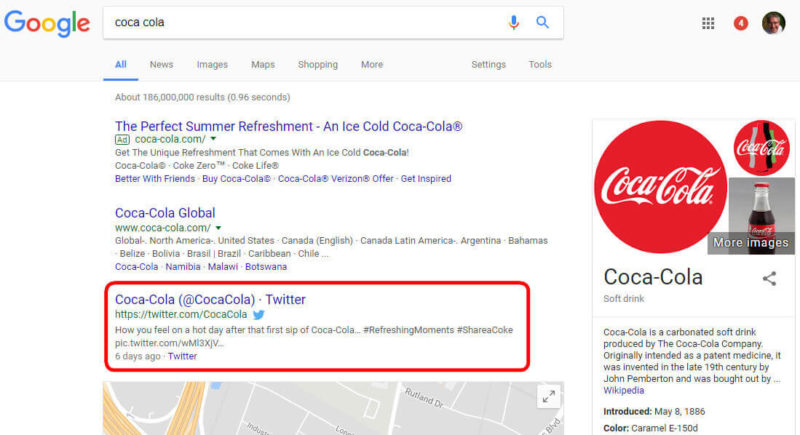When Patrick Ambron founded BrandYourself, he saw a need in the market for managing information about yourself on the internet. This has turned into a profitable company with a toolkit of resources for evaluating your online reputation and minimizing and burying potentially harmful search information.
This article zooms in on one avenue any person can optimize on their own, and it stems from Google somewhat recently including Twitter information in search results. If you search for most people's names, as you'll see below, a Twitter handle comes up as one of the top results. This is an opportunity to control what people find when they search for you, and there are a few things you can do to make sure your Twitter account is a top search result.

While your personal brand may not be as important for digital marketers, managing your company's brand follows the same logic.
The first piece of insight is just simply to utilize all the fields that Twitter offers to input information. Make sure you enter information into the Full Name field, the Bio, and the URL fields. Through out your design, always be thinking of how someone searching for your company/product would enter information into the search bar. It's important to include these search words in your bio and to make your handle relevant to this search.
As with normal SEO, you want your handle to seem important, so establishing links to your handle from your webpage and from other social media pages helps boost the search score. Tweeting often and incorporating emojis also make your tweets more relevant and thus rank higher on the search results. Things like posting pictures on your Twitter account and setting up Twitter Cards also help.
There are a number of other tricks listed out in the article, but the general principle is that you need to be active on Twitter through posting and re-tweeting, build your user base, and post quality content.
I think this article is interesting and relevant for another reason, a future potential challenge for Google. For all the bad press Twitter gets as a failing company, it's relevance is undeniable, and other social media sites are also growing in relevance. The choice to include Twitter feed/Tweets in Google search results, takes up real estate on search results, which pushes other results down the page. Maybe it's indicative of what is actually relevant to search these days, but as other companies grow in legitimacy, will Google include those posts in search results also? How do certain elements of social media breach the threshold relevancy? And how much real estate can Google afford to dedicate to social media results? It's interesting to see how Google's algorithms act as sort of a stamp of approval on what makes things 'legitimate' enough to include as search results.
Twitter SEO Ninja Tricks
This article zooms in on one avenue any person can optimize on their own, and it stems from Google somewhat recently including Twitter information in search results. If you search for most people's names, as you'll see below, a Twitter handle comes up as one of the top results. This is an opportunity to control what people find when they search for you, and there are a few things you can do to make sure your Twitter account is a top search result.

While your personal brand may not be as important for digital marketers, managing your company's brand follows the same logic.
The first piece of insight is just simply to utilize all the fields that Twitter offers to input information. Make sure you enter information into the Full Name field, the Bio, and the URL fields. Through out your design, always be thinking of how someone searching for your company/product would enter information into the search bar. It's important to include these search words in your bio and to make your handle relevant to this search.
As with normal SEO, you want your handle to seem important, so establishing links to your handle from your webpage and from other social media pages helps boost the search score. Tweeting often and incorporating emojis also make your tweets more relevant and thus rank higher on the search results. Things like posting pictures on your Twitter account and setting up Twitter Cards also help.
There are a number of other tricks listed out in the article, but the general principle is that you need to be active on Twitter through posting and re-tweeting, build your user base, and post quality content.
I think this article is interesting and relevant for another reason, a future potential challenge for Google. For all the bad press Twitter gets as a failing company, it's relevance is undeniable, and other social media sites are also growing in relevance. The choice to include Twitter feed/Tweets in Google search results, takes up real estate on search results, which pushes other results down the page. Maybe it's indicative of what is actually relevant to search these days, but as other companies grow in legitimacy, will Google include those posts in search results also? How do certain elements of social media breach the threshold relevancy? And how much real estate can Google afford to dedicate to social media results? It's interesting to see how Google's algorithms act as sort of a stamp of approval on what makes things 'legitimate' enough to include as search results.
Twitter SEO Ninja Tricks
No comments:
Post a Comment